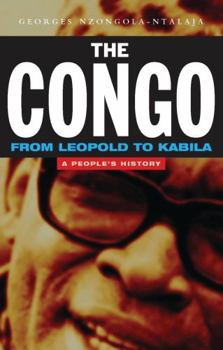The Congo: From Leopold to Kabila: A People's History
Select Format
Select Condition 
Book Overview
The people of the Congo, as this book shows, have suffered cruelly throughout the past century from a particularly brutal experience of colonial rule; and, following independence in 1960, external interference by the United States and other powers, a whole generation of patrimonial spoliation at the hands of Mobutu (the dictator installed by the West in 1965), and periodic warfare which even now continues fitfully in the East of the country. But,...
Format:Paperback
Language:English
ISBN:1842770535
ISBN13:9781842770535
Release Date:May 2002
Publisher:Bloomsbury Publishing PLC
Length:320 Pages
Weight:0.95 lbs.
Dimensions:0.8" x 5.5" x 8.5"
Customer Reviews
2 ratings
Best one volume history of Congo (RDC) in English
Published by Thriftbooks.com User , 14 years ago
For anyone interested in the history of the Democratic Republic of the Congo, this is the book to read. The author is a Congolese with solid academic credentials and a passionate concern for the people of Congo. It covers somewhat more than the last century, and the author has been personally involved in the last four decades of Congo's history, bringing penetrating insight and profound knowledge of the inner dynamics of the country's evolution. He has a keen feel for political currents in Kinshasa, even the acerbic humor of "Kinois" society, which for instance called the UDI political party in the 90s the "Union des détourneurs incorrigibles" (Union of incorrigible embezzlers). The Preface has a brief autobiography which positions the author in relation to the government there, one which he confronted boldly. Nzongola-Ntalaja states that "This book is a study of the democracy movement in Congo, from the standpoint of popular resistance to exploitation and repression, for a better social and political order" (3), and the perspective molds the entire book. This should not be surprising from a person who spent most of his life in exile and in resistance to the powers governing his own nation. He emphasizes those groups and individuals in Congo's history who have resisted the government. This is not an official history! Along with Democracy, another related theme running through the book is that of the tremendous weight of external influences in Congo's history over the last century. Beginning with King Leopold of the Belgians, through the colonial rulers which followed him, on to the Cold War superpowers, and finally invading neighboring African states like Uganda and Rwanda, Congo's vast riches and strategic location have attracted outsiders. As to Western powers since Congo's independence, they have preferred to support "technocrats" (such as Kengo) rather than leaders with a popular base (like Tshisekedi) who are more likely to listen to the people than the foreigners. He finds Mobutu, Kabila, and Bemba to all be exploiters, using the great wealth of the nation to enrich themselves and their external supporters rather than serving the needs of the people. Unlike Ndaywel's longer general history in French,1 Nzongola-Ntalaja does not cover the pre-colonial period. After the Introduction, the next section covers the colonial period, beginning with the infamous King Leopold of the Belgians, who began the colony under the ironic name of the Congo Free State, founded officially in 1885. Nzongola-Ntalaja describes in detail the suffering of the Congolese people under the cruelties of the exploitative Leopoldian regime, as they were forced to produce ivory and especially rubber for the burgeoning factories of Europe. Hoschchild's recent book on this topic is known to many readers.2 Nzongola-Ntalaja's evaluation of the Belgian Congo regime which followed in 1908 is only somewhat less negative, with the rubrics being economic expl
History written by a Congolese
Published by Thriftbooks.com User , 19 years ago
This book is great because it offers the best information you can find on the internal resistance against colonial rule, on the mobutu dictatorship and on the Conférence Nationale Souveraine (beginning of the 90s). The very extensive descriptions of the changing classes in the Congolese society are somewhat boring. And the book poorly describes what happens after 97. Ntalaja's english is easy reading for non-native speakers like myself ;-)






